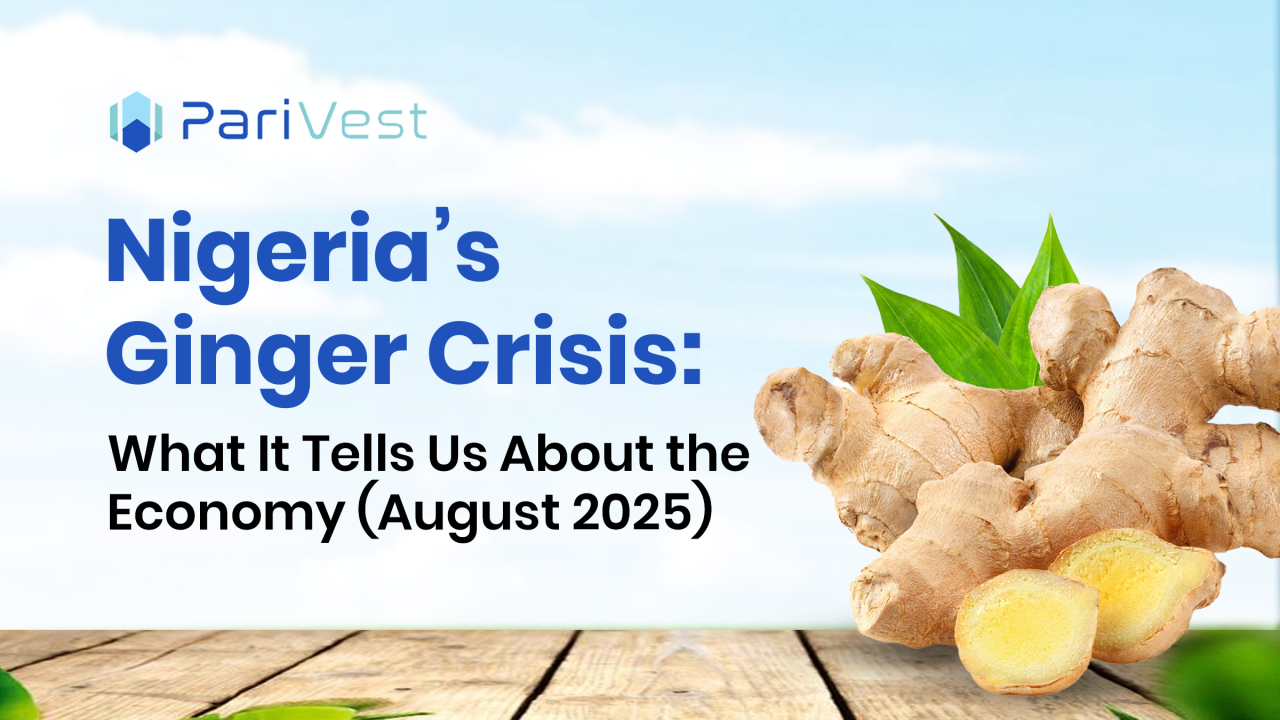
Nigeria’s Ginger Crisis: What It Tells Us About the Economy (August 2025)
For decades, ginger stood as both a household essential and one of Nigeria’s proudest agricultural exports—flavouring meals, serving as medicine, and even finding its way into cultural slang. It was abundant, affordable, and part of daily life.
Now, the spice has become a luxury. Once Africa’s largest producer, Nigeria is struggling with disease outbreaks, export-driven scarcity, and middlemen exploitation—pushing ginger out of ordinary kitchens and endangering the livelihoods of the farmers who depend on it.
What Happened?
A sharp rise in ginger prices began in late 2023, when the outbreak of a fungal epidemic—ginger blight—devastated farms across Kaduna, Nasarawa, Plateau, and Abuja. These states, responsible for 85% of national production, lost as much as 90% of their harvests, with government estimates putting total losses at ₦12 billion.
In 2024, the Federal Government announced a ₦6 billion intervention through the National Agricultural Development Fund (NADF) to support farmers. However, many farmers reported that critical inputs such as fungicides and other forms of assistance never reached them. Widespread mismanagement undermined the initiative, and instead of stabilising the market as intended, it deepened scarcity and worsened the situation.
Simultaneously, foreign demand surged. With the naira down more than 70% since mid-2023, Nigerian ginger became cheaper for international buyers. Traders from Vietnam, Sudan, Niger, and Benin paid high prices, while middlemen cornered supplies in partnership with exporters. Farmers, lacking direct market access, sold at low margins while downstream profits soared.
How Prices Skyrocketed
The effect on local prices has been dramatic. In early 2023, a 50kg bag of high-quality ginger sold for about ₦35,000. By late 2024, that same bag cost ₦800,000, an increase of more than 2,000%. Even lower-grade ginger, once a fallback, climbed to around ₦620,000 per bag.
For consumers, the effect has been devastating. A single mudu—the one-kilogram bowl measurement used in local markets—now costs around ₦20,000. Petty traders in Abuja and Kaduna say they have stopped selling ginger altogether, as buyers simply cannot afford it.
Economic and Social Impact
The consequences for Nigeria’s export market have been severe. According to National Bureau of Statistics data, ginger exports fell by 74% in the first nine months of 2024, declining from ₦23.76 billion in 2023 to ₦6.28 billion.
The cost of cultivation has also spiralled out of control. Farmers report paying more than ₦300,000 for a single bag of seed. With a hectare requiring about 30 bags, total costs exceed ₦9 million per hectare.
Beyond economics, the ginger crisis has disrupted social and cultural life. Ginger, central to Nigerian cooking and widely used in homemade remedies for coughs, indigestion, and inflammation, is increasingly absent from households. The crisis is also hitting rural communities hard. With ginger farming unprofitable, many young people in Kaduna and Plateau are abandoning agriculture, fuelling rural-urban migration and worsening insecurity in already fragile areas.
Government Response
Policy responses have so far been limited. While the government set up a task force in 2024 and released funds through the National Agricultural Development Fund, farmers argue that interventions have failed to address the real problems: disease-resistant seed varieties, transparent supply chains, and access to southern farmlands that could diversify production.
Some industry leaders have called for a temporary export ban to stabilise supply, but the Nigerian Export Promotion Council has ruled this out, saying ginger—like cocoa and sesame—is too important as a source of foreign exchange. In the meantime, Nigeria continues to export raw ginger while importing processed derivatives at five times the cost, losing out on value addition and branding opportunities.
Looking Ahead
Nigeria, once producing more than half a million metric tons of ginger annually and valued at $1.3 billion on the global stage, is now in danger of losing its position to India and China. Without structural reforms, the cycle of disease outbreaks, price shocks, and export losses will continue.
The lesson is clear: Nigeria must develop a national strategy that protects farmers, stabilises supply, and invests in processing. Without decisive action, ginger may shift from being Nigeria’s agricultural pride to another cautionary tale of lost opportunity.
At PariVest, we analyse these evolving agricultural and economic landscape, keeping you informed on all you need to know.
For enquiries, contact us at support@parivest.com.


